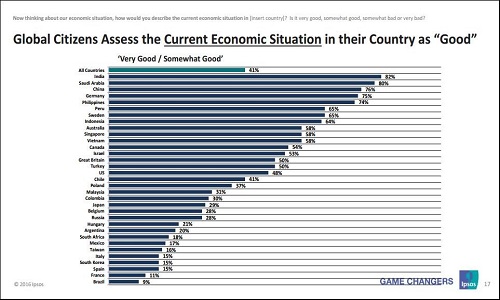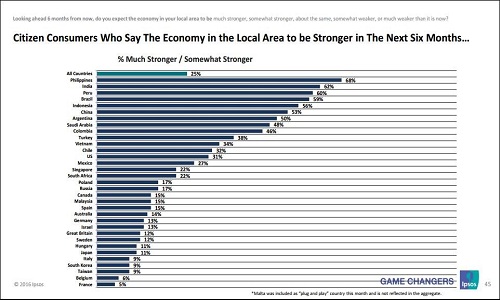Filipinos the Most Optimistic about Economic State among SEA Countries
In a survey conducted by leading global market research company Ipsos in 25 countries, results show that majority of Filipinos have a positive perception of their current state of economy, with 74% describing the Philippine’s current economic situation as very good/somewhat good. With 41% as global average, this percentage is one of the highest globally with only 4 other countries getting a higher percentage - India, Saudi Arabia, China, and Germany.

In the SEA region, of six (6) countries covered, the Philippines has the highest percentage of respondents with positive assessment of current economic situation – both at the nationwide (macroeconomic) and local area (provincial/city/municipal) levels.

The economic outlook is also positive for the future, with the Philippines recording the biggest proportion (68%) who think that their local economy will be much stronger/ somewhat stronger in 6 months.

About the Survey
The Ipsos Global @dviser” The Economic Pulse of the World - October 2016 survey was conducted between September 23rd and October 7th 2016 with an international sample of 18,064 adults in 25 countries around the world via the Ipsos Online Panel system. The countries reporting herein are Argentina, Australia, Belgium, Brazil, Canada, China, France, Great Britain, Germany, Hungary, India, Israel, Italy, Japan, Mexico, Peru, Poland, Russia, Saudi Arabia, South Africa, South Korea, Spain, Sweden, Turkey and the United States of America.
The results for this wave include extra countries: Chile, Colombia, Indonesia, Malaysia, Philippines, Singapore, Taiwan and Vietnam. While these have been added, the total average scores for each section have been calculated without taking these countries into account in order to keep the core 25 country tracking scores consistent with previous waves. Each country has at least 500 completed interviews (n=500 for the Philippines). We occasionally add extra countries to the report for regional insight.
In countries where internet penetration is approximately 60% or higher the data output is comparable to the general population. For countries with lower levels of connectivity, including the Philippines, the data may not be reflective of the general population; however, the online sample in these countries are particularly valuable in their own right as they are more urban/ educated and with higher income than their fellow citizens and are often referred to as “Upper Deck Consumer Citizens”.



